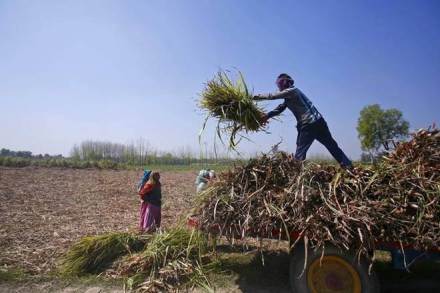Amid lockdown, the Andhra Pradesh government has introduced a farmgate system to procure agricultural produce directly from the doorstep of farmers at the village level. To start with, the government will be procuring paddy by agriculture assistants at the village secretariats. This system will help farmers not to carry their produce to the procurement centres and will also end the role of middlemen to a large extent.
According to state agriculture minister K Kannababu, the state government will procure paddy and all other agricultural produce from farmers to ensure minimum support price (MSP) for them. In all, the government has procured 57,000 tonne of all agricultural produce. For paddy in the current rabi season, the total production is estimated to be 56.98 lakh MT. “The estimated paddy purchases by the civil supplies department is approximately 32.72 lakh MT by August and rough estimates of the value is about Rs 5,945 crore,” the agriculture department officials said.
Describing the new system as a revolutionary reform, chief minister YS Jagan Mohan Reddy said this is the first time that paddy procurement is being done directly at the village level. “Over 4.5 lakh farmers need not to carry their produce to the procurement centres. The move will also end the role of middlemen,” Reddy said. The chief minister also said the state government had stopped the procurement of rice from Telangana to ensure that the farmers in Andhra Pradesh would not be forced to sell their produce at a rate lower than the MSP.
Meanwhile, the department of agriculture marketing has come up with a mobile application by which people can order vegetables and fruits at their respective doorsteps. “The department of agriculture marketing has scaled up its door delivery services. About one-fourth (25%) of the products are being sold through the door delivery system. The process of onboarding logistical partners is underway and an app will be launched soon,” Reddy said. A data collecting system is set in place. Every day, data of price fluctuations and recorded prices are obtained by the government from all the 11,000 villages in the state. This helps the authorities identify those pockets in which crops are being sold below the MSP.
Utilising the possible resources of the government, a total of 451 Andhra Pradesh State Road Transport Corporation (APSRTC) buses have been converted into mobile Rythu Bazaars selling a wide range of essentials straight from the farm. This ensures that the supply of the essentials reaches even the most remote areas apart from helping authorities implement social distancing norms on the ground. To follow social distancing norms, permanent paint and lime powder has been made across all Rythu Bazaars. The demarcations helps in social distancing to avoid crowd during the relaxation period. Tokens are being issued at certain Rythu Bazaars during peak hours.
To ensure that no vendor misuses the lockdown and charges exorbitant prices for essentials and the list is displayed infant of shops, supermarkets and Rythu Bazaars. The district committee is fixing prices for 10 essential commodities such as rice, four varieties of dal, three varieties of oil and vegetables.
Farmers cultivating fruits like bananas are facing their own set of problems with excess production. The government has started to procure huge volumes and selling it to households at nominal prices. Bananas are presently being sold at Rs 10 per kg while supermarkets across the state are charging nearly Rs 70 per kg. A total of 7,000 MT of bananas have already been procured by the department till date.
Meanwhile, over 700 procurement centres have been set up which are nearer to farms and farmlands across the state. Jowar, red gram, bengal gram, maize and turmeric are procured through these centres. This leaves minimal distances for the farmers to travel, to sell their products and save on transportation costs.
